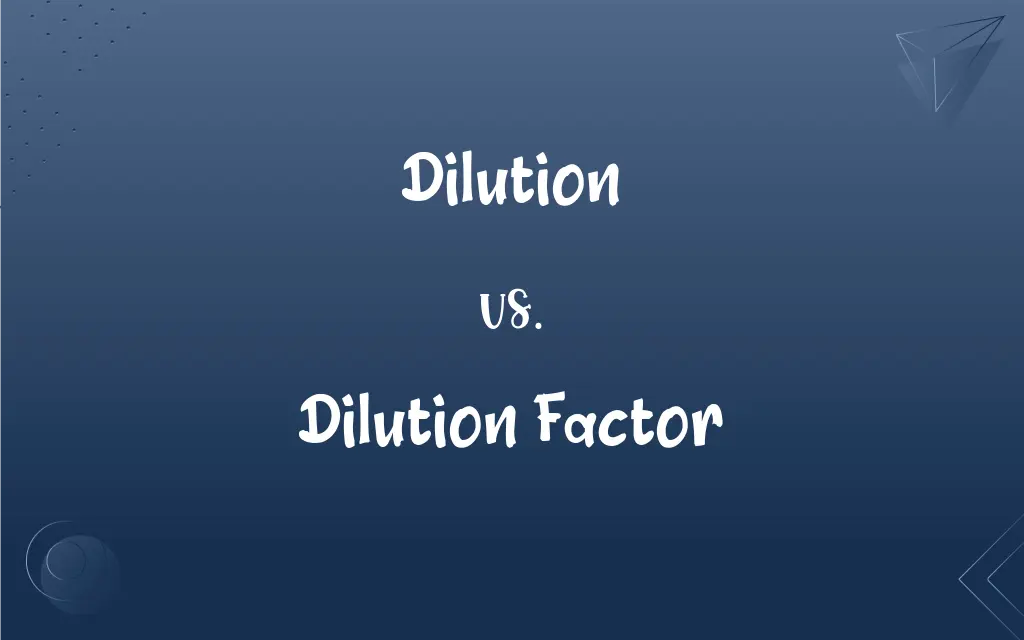Dilution vs. Dilution Factor: What's the Difference?
Edited by Aimie Carlson || By Janet White || Published on March 6, 2024
Dilution is the process of reducing a solution's concentration, while dilution factor is the ratio used to determine the new concentration after dilution.

Key Differences
Dilution involves adding a solvent to a solution to decrease its concentration, whereas dilution factor quantifies the extent of this process. Dilution is a common laboratory procedure aimed at achieving a desired concentration level, and it is essential in various scientific fields, including chemistry and biology. The dilution factor, on the other hand, is a numerical value representing the ratio of the final volume to the initial volume of the solution, providing a precise measure of how much the solution has been diluted.
When performing a dilution, the primary goal is to lower the concentration of a solute within a solvent, thereby reducing the solution's overall potency. The dilution factor then serves as a crucial calculation in this process, guiding the technician on the amount of solvent to add to achieve the target concentration. It's important to note that while dilution directly affects the solution's composition, the dilution factor is a subsequent calculation used to describe or plan this change.
In practical applications, the dilution of a substance is often required to bring its concentration within a measurable range, suitable for various analytical techniques. The dilution factor plays a vital role here, as it helps in determining the necessary volumes for the dilution process, ensuring that the final concentration is appropriate for the analysis to be conducted. This makes understanding both dilution and dilution factor essential for accurate experimental outcomes.
The concept of dilution is also relevant in contexts outside the laboratory, such as in pharmacology, where medications might be diluted to achieve the correct dosages for administration. Similarly, the dilution factor is pertinent in these scenarios, as it provides a clear and calculable method to ensure that the final solution meets the precise therapeutic requirements. Thus, while dilution and dilution factor are closely related, they serve distinct roles in both scientific and practical applications.
Comparison Chart
Definition
The process of reducing concentration by adding solvent
The ratio indicating the extent of dilution
ADVERTISEMENT
Purpose
To achieve a desired concentration
To quantify the dilution process
Calculation
Not directly calculated, but achieved through the process
Calculated as the final volume divided by the initial volume
Role in Experimentation
Alters the solution's concentration
Helps in planning and replicating the dilution process
Practical Applications
Used in laboratory, pharmacology, and various industries
Essential for precise dilution calculations
Dilution and Dilution Factor Definitions
Dilution
The process of making a liquid less concentrated.
The laboratory technician performed a dilution to prepare the sample.
ADVERTISEMENT
Dilution Factor
A numerical value representing how much a solution has been diluted.
We used a dilution factor of 5 to prepare the standard solutions.
Dilution
Reducing the strength of a solution by mixing with more solvent.
A dilution step was crucial for achieving the correct concentration for testing.
Dilution Factor
The quotient obtained by dividing the final solution volume by the original volume.
The experiment required calculating the dilution factor for accurate results.
Dilution
The act of watering down a substance.
The paint's color was adjusted through dilution.
Dilution Factor
A measure used to describe the degree of dilution.
To achieve the desired concentration, a dilution factor of 20 was necessary.
Dilution
Adding solvent to a solution to decrease the concentration.
The dilution of the acid was necessary to safely conduct the experiment.
Dilution Factor
The factor by which the concentration of a solution is reduced.
The solution's concentration was reduced by a dilution factor of 100.
Dilution
Lowering the potency of a chemical compound.
For the reaction, a careful dilution of the reactant was required.
Dilution Factor
The ratio of the final volume to the initial volume after dilution.
A dilution factor of 10 means the solution was made ten times less concentrated.
Dilution
The process of making weaker or less concentrated.
Dilution
A dilute or weakened condition.
Dilution
A diluted substance.
Dilution
A decrease in the equity position of a share of stock because of the issuance of additional shares.
Dilution
The process of making something dilute.
Dilution
A solution that has had additional solvent, such as water, added to it into order to make it less concentrated.
Dilution
The process of bringing in unskilled workers to replace skilled ones, for example during wartime.
Dilution
(finance) share dilution
Dilution
The act of diluting, or the state of being diluted.
Dilution
A diluted solution
Dilution
Weakening (reducing the concentration) by the addition of water or a thinner
FAQs
How is dilution factor calculated?
Dilution factor is calculated as the final volume of the solution divided by the initial volume of the solution before dilution.
Is dilution always performed with water?
While water is a common solvent for dilutions, other solvents can also be used depending on the solute and desired application.
Can dilution affect the pH of a solution?
Yes, dilution can affect the pH of a solution, especially if the solute is acidic or basic.
What is dilution in chemistry?
Dilution is the process of reducing the concentration of a solute in a solution by adding more solvent.
What's the difference between serial dilution and simple dilution?
Serial dilution involves multiple, sequential dilution steps, while simple dilution is a single dilution step.
How does dilution impact the concentration of a solution?
Dilution decreases the concentration of a solute in a solution by increasing the volume of the solvent.
What does a dilution factor of 1:100 mean?
A dilution factor of 1:100 means the original solution was diluted to 100 times its original volume.
How do you perform a dilution in a lab setting?
To perform a dilution, you add a specified volume of solvent to a known volume of solution to achieve the desired concentration.
What role does dilution play in drug administration?
Dilution is crucial in preparing drug dosages to ensure they are administered at safe and effective concentrations.
Can dilution factor be less than 1?
No, dilution factors are typically greater than 1, indicating an increase in volume and a decrease in concentration.
What is a practical example of dilution outside the lab?
Adding water to concentrated fruit juice to make it drinkable is a common example of dilution.
How does dilution affect the mass of a solute in a solution?
The mass of the solute remains unchanged during dilution; only the volume of the solution and the solute's concentration change.
Why is dilution factor important in laboratory experiments?
The dilution factor is important for accurately determining the concentration of solutions and replicating experiments.
How can dilution factor affect analytical results?
An incorrect dilution factor can lead to inaccurate concentration measurements and analytical results.
Is it possible to reverse a dilution?
Reversing a dilution is not feasible because removing solvent to concentrate the solution again can alter the solute.
What precautions should be taken when diluting strong acids or bases?
When diluting strong acids or bases, always add the acid or base to the solvent to minimize the risk of exothermic reactions.
Why is accurate volumetric measurement important in dilution?
Accurate volumetric measurement ensures the desired concentration is achieved and maintains the precision of the dilution process.
What is the significance of the dilution factor in environmental testing?
In environmental testing, the dilution factor is critical for diluting samples to levels that are within the detection limits of analytical instruments.
How do you choose the solvent for a dilution?
The solvent is chosen based on its compatibility with the solute and the intended use of the diluted solution.
Can dilution be used to purify a solution?
Dilution doesn't purify a solution; it only reduces the concentration of all components, including impurities.
About Author
Written by
Janet WhiteJanet White has been an esteemed writer and blogger for Difference Wiki. Holding a Master's degree in Science and Medical Journalism from the prestigious Boston University, she has consistently demonstrated her expertise and passion for her field. When she's not immersed in her work, Janet relishes her time exercising, delving into a good book, and cherishing moments with friends and family.
Edited by
Aimie CarlsonAimie Carlson, holding a master's degree in English literature, is a fervent English language enthusiast. She lends her writing talents to Difference Wiki, a prominent website that specializes in comparisons, offering readers insightful analyses that both captivate and inform.
































































